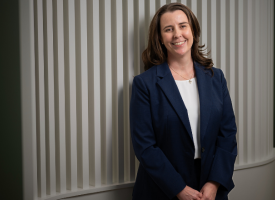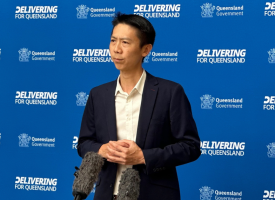AMA President at doorstop before meeting of medical colleges, associations and societies
Transcript: AMA President Professor Steve Robson and College Presidents at peak medical bodies meeting in Canberra
Subject: Peak medical bodies work together to come up with strategies to make healthcare accessible, affordable and effective.
STEVE ROBSON: Well, good morning. I'm Steve Robson, Federal President of the AMA, and we're here this morning with Australia's 50 peak medical bodies to discuss various stresses on the Australian health system. All Australians can recognise that's it difficult to get to see a doctor. It's difficult to have a procedure or an operation in a public hospital. And even if you have private health insurance, there are stresses in the care that you can get. This is major issue for healthcare in this country, and we're need to discuss solutions with the Federal Health Minister and the department today.
So I'm going to hand over to Dr Kerin Fielding, who is the Federal President of the Royal Australasian College of Surgeons.
KERIN FIELDING: Thanks, Steve. We're here today to collaborate with Government and jurisdictions to try and look how to improve coordination of the health system. We understand the problems in the public health system - we have a lack of availability of procedures, a backlog of waiting lists after COVID, and it's really important that we work together and collaborate to try and improve this symptom of a system that is under strain.
STEVE ROBSON: Thank you. I'm going to hand over now to Dr Nicole Higgins, who is the President of the Royal Australian College of General Practitioners.
NICOLE HIGGINS: Thanks, Steve. Good morning. So, my name's Dr Nicole Higgins, I'm the President of the Royal Australian College of General Practitioners, a GP in regional Australia, and also here with Kerin representing the Council of Presidents of our Medical Colleges. Never before have all of the medical colleges and those involved in the healthcare sector met together to collaborate, to coordinate and to discuss solutions for our healthcare system. We're here to work with the Government to find solutions around access, around workforce, and improving healthcare delivery to all Australians, irrespective of where you live and where you earn and where you work. So thank you.
STEVE ROBSON: Sorry about that. And our next speaker is Dr Stephen Gourley, who's the President of the Australasian College of Emergency Medicine.
STEPHEN GOURLEY: Thank you, Steve. My name is Dr Stephen Gourley. I'm the President of the Australasian College for Emergency Medicine, and I am an emergency physician that lives and works in Alice Springs. I know firsthand what it's like to work in a rural regional area, and the challenges that really face people in those areas. About one third of Australia's population lives rurally, and we really need to be stepping up. Our overcrowded emergency departments are a symptom of the failing health system that we've got at the moment. What we're doing right now isn't working. We need fundamental change to the system, and that's what we're here to talk about.
STEVE ROBSON: I take it there are no questions, unless you want to ask…
JOURNALIST: I'll just ask one of you, Steve. Like, what are you hoping to get out of today? What's the outcomes for today [indistinct]?
STEVE ROBSON: We know there are many challenges facing the Australian health system. Today's opportunity, the peak doctor's groups in a room to work with the key decision makers here in Australia to come up with some strategies to make healthcare accessible, affordable and effective for every Australian.
JOURNALIST: Excellent. Thank you all.
JOURNALIST: You've come out today asking the Government to [indistinct] mental health. What are you asking the Government to do?
ASTHA TOMAR: I suppose one we do want to say our thanks to the Federal Government as well as the state governments for their focus on mental health in the last few years. And it's also important to recognise that it has been decades of disinvestment in mental health which has brought us to this position today, where we are a part of a crumbling mental health system.
JOURNALIST: And what is it that people are struggling with in the system at the moment?
ASTHA TOMAR: Well, everybody is struggling with access to care, access to timely, evidence-based care, which is to be delivered to - be in the public health system or a private health system. So all the governments and all the agencies, we are hoping that there is a coordinated effort on their part to bring it all together.
JOURNALIST: What kind of investment do you think is needed from the Government to address the issues?
ASTHA TOMAR: Definitely a financial investment, but it's also the skin in the game to make this right. So it's not just the financial, but targeted investment. Let's say the training positions. Let's say looking at the system as a coordinated effort.
JOURNALIST: And you're here today with the other colleges at this meeting by the AMA. What are you hoping to get out of today?
ASTHA TOMAR: Again, we're all a part of the health system, and psychiatry as a part of the health system is equally important to that access to universal healthcare. I agree that in physical health system we have similar difficulties. But as far as the mental health system goes, that struggles a lot more, and I think that's largely because of the disinvestment and poor attention to that system for many, many years.
JOURNALIST: Is there anything else that you wanted to get out from that?
ASTHA TOMAR: That's what we're asking for. Forty-five additional training places for psychiatrists.
JOURNALIST: So, what are you asks for the Government?
ASTHA TOMAR: So we do- we are aware that quite a few new doctors would like to pursue specialist training in psychiatry. We are talking about shortage of psychiatrists. So what we are hoping to achieve is more funded training physicians. At this point, we are requesting for about 45 training physicians for staff. And it's not just the training of physicians, it's also the systems towards that training of physicians - let's say the directors of training, the whole system around the training of physicians.



